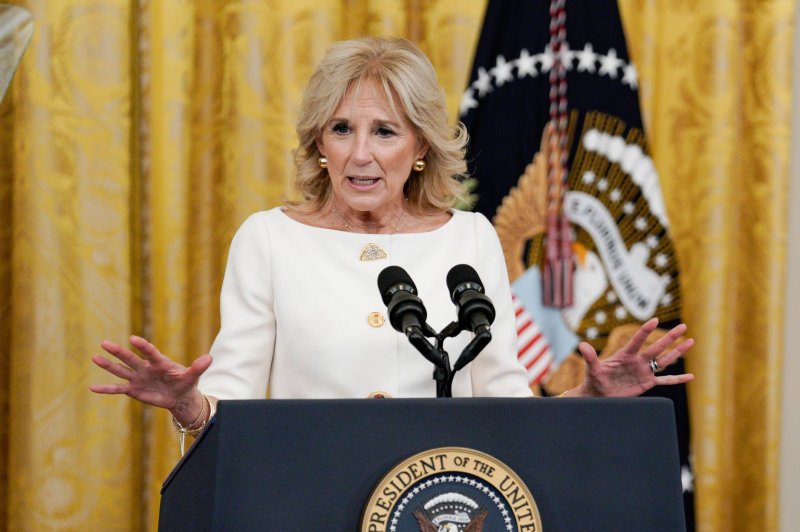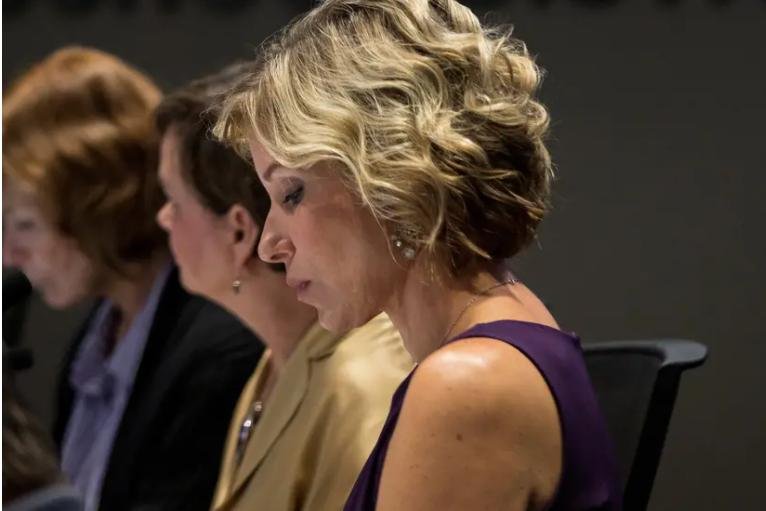
Jean Lee
Sun, February 6, 2022, 10:37 AM·9 min read
Marian Weber says she wanted to make Ketchikan, Alaska, her forever home. With its widespread greenery and rainy days, and waterfront crowded by houses, it was a long-awaited dream. And staying for good seemed like a real possibility.
Weber, 47, was a travel nurse contracted to work at the city-owned Ketchikan Hospital, run by PeaceHealth, a not-for-profit health care system. She says she arrived in April 2021, and the hospital renewed her contract in August before promptly terminating it within the same month.
“They thanked me for extending, they were excited that I was going to stay through the winter, and then a few hours later, they rounded back just asking if we had anything we wanted to discuss,” said Weber. “I escalated a problem.”
The problem Weber said she escalated was a patient safety concern. She explained that two intensive care level Covid-19 patients — one who was intubated and one who required continuous BiPAP (ventilator) support — needed the central monitoring system and transparent doors an ICU room provides.
Instead, Weber said the patients in need of critical care had been placed in the medical-surgical unit with opaque doors and without a central monitoring system, making continuous observation difficult. She says she was worried that nurses might miss something, potentially leading to “catastrophic consequences.” Weber said there were available ICU beds at the time and that the hospital’s possible solution of keeping a nurse in the room for 12 hours, “for prolonged exposure” to Covid-19, didn’t seem sustainable to her.
“I worked my shift Saturday, I had Sunday off, and then I worked Monday,” said Weber. “And then Tuesday morning, my phone is blowing up at 4:30 in the morning, and I wake up and see all these missed calls. I call back, and that’s when my agency said that PeaceHealth has terminated my contract immediately. And that I was not to go to work that day.”
Days before she was terminated, Weber filed an internal complaint after she said she was afraid of retaliation for reporting a safety concern.
“It’s our job to advocate for safety,” she said. “We should be doing this stuff. That’s what we’re supposed to do.”
Following her termination for what PeaceHealth said was “creating an unsafe hostile environment,” she filed a charge with the National Labor Relations Board (NLRB).
“Then the NLRB started their investigation of her charge quickly,” said Robert Liu, Weber’s attorney. “After that, they investigated this claim by interviewing some of the key witnesses provided by Marian. After a series of interviews, the NLRB found Marian’s charge was credible.”
PeaceHealth said that it has “carefully listened to and evaluated concerns about levels of care required for patients” at Peace Health Ketchikan. “After independent review by medical staff, we determined that appropriate standards were in place and adhered to,” said PeaceHealth Chief Physician Executive, Doug Koekkoek.
Careworn health care workers, burned out after nearly two years of fighting the pandemic, are duty-bound to speak up for their patients but some fear risking retribution from their employers for doing so. Five nurses at hospitals either owned or operated by PeaceHealth spoke to NBC News about the consequences they say they faced when trying to advocate for patient and nurse safety.
“Nurses have to speak up in order to make sure the patient doesn’t have a bad outcome,” said Donna Phillips, Alaska Nurses Association’s labor council chair and a former nurse.
The issue of ignored safety reports and fear of retribution for bringing up safety concerns isn’t unique to Covid-19, said Phillips, who added that she feels as if hospitals sometimes used the pandemic as a scapegoat for longtime problems.
“In my 42 years as a nurse, not once did I receive a response when reporting a safety concern,” said Phillips. According to Phillips, Weber’s consequences were severe but her contract termination was not a stand-alone case.

Sarah Collins, who was fired from PeaceHealth Southwest Medical Center after raising safety concerns. (Courtesy Sarah Collins)
Sarah Collins said she was fired from her staff nurse position at PeaceHealth Southwest Medical Center in Washington state after raising safety concerns.
“I just feel like, ‘Is this really happening?’ Because I’ve always just really prided myself on being a nurse,” said Collins, 41. “That’s part of my personality, being a nurse and making sure that I take really great care of my patients. And so it’s been a huge blow to my sense of worth.”
Collins, who worked at PeaceHealth Southwest Medical Center since 2016, rented a separate apartment in the early days of Covid-19.
“I was terrified of bringing it home to my family,” she said.
She said she worked 12-hour shifts with almost no breaks and spent every free moment during that time having brief, socially distanced visits with her family in their yard. Collins said she was concerned about nurse and patient safety, specifically nurse-to-patient ratios.
She brought the issue, along with other concerns, to news outlets and started a Facebook group for nurses after trying to raise her concerns with PeaceHealth Southwest Medical Center.
“Nurses need to have everything that they need in order to promote healing,” Collins said. “Staffing is a challenge. People have needs.”
The problem of nurses being overworked, even in unionized hospitals, has been an issue for at least a decade, said Ruth Milkman, a sociologist of labor and professor at the City University of New York’s Graduate Center, but Covid has made the problem even worse.
“If nurses and other health care workers are overworked, the probability of medical errors goes up, and care is compromised,” Milkman said. “So patients and their families have a lot at stake here.”
In mid-September, Collins gave an interview to the local news interview set up by her union and was put on a three-month administrative leave for violating the company’s media policy. When she returned from her administrative leave, the hospital had a list of reasons for her job termination that included “operating outside her scope of practice” and “failing to follow policy,” she said.
Following her termination she filed complaints with the NLRB and Occupational Safety and Health Administration (OSHA). Those complaints are still pending.
With regard to staffing ratios Koekkoek said, “Across all our facilities, in Washington and elsewhere, PeaceHealth consistently meets or exceeds all regulatory requirements for staffing and the provision of safe, effective care.”
There is an ongoing lawsuit with a certified class of about 9,000 hourly paid health care workers at three PeaceHealth hospitals: PeaceHealth St. Joseph, PeaceHealth St. John and PeaceHealth Southwest, where Collins worked.
The lawsuit, filed in April 2020 in Clark County Superior Court in Washington, claims that the work environment at PeaceHealth Southwest prevented workers from taking all lawfully required meal and rest breaks, and that employees were discouraged from reporting all the breaks they missed.
“I didn’t participate in this suit because I always claimed my breaks,” said Collins. “But I’ve been watching closely and doing my part to encourage nurses.”
In addition to the claim against PeaceHealth Southwest, there was a separate claim on alleged unpaid wages due to time-clock rounding made against PeaceHealth St. Joseph and St. John.
The parties in that case agreed this week on the terms of a settlement and will present them to the Clark County Superior Court in Washington for approval.
“Now more than ever, we recognize the invaluable role health care workers play in our communities,” said Peter Stutheit, one of the lawyers representing health care workers in the case. “I’m pleased that PeaceHealth came to the table and settled on terms I believe to be fair.”
PeaceHealth said it could not comment at this time on the lawsuit as details of the settlement are not yet available.
Ming Lin, an emergency medicine physician, filed a lawsuit to get his job back at St. Joseph Medical Center in Bellingham, Washington, which is owned by PeaceHealth. He says he was fired in March 2020 after critiquing his hospital’s response to the coronavirus pandemic. He posted to Facebook a letter he sent to the hospital’s chief medical officer.
The letter outlined seven safety concerns related to Covid-19, including “waiting for influenza test" before deciding it's the coronavirus. He suggested checking staff temperatures at the start of shifts and triaging patients in the parking lot outside the emergency room to mitigate infection.
“Dr. Lin spoke out about PeaceHealth’s inadequate COVID-19 procedures,” the American Civil Liberties Union of Washington, currently representing Lin, told NBC News. “Instead of being met with gratitude and collaboration, PeaceHealth fired him. People rely on emergency room and medical staff to provide the best health care possible. This is impeded when hospitals silence advice meant to protect workers and the public.”
A representative from the ACLU of Washington told NBC News that his case was currently awaiting a trial date, delayed because of Covid-19.
According to the lawsuit, PeaceHealth Chief Operating Officer Richard DeCarlo said in an interview with ZdoggMD in April 2020 that Lin was terminated because he “created a toxic work environment.” DeCarlo went on to say that Lin posted misinformation on Facebook.
In a statement issued to NPR in May 2020, PeaceHealth said Lin “chose to not use designated safety reporting channels, and his actions were disruptive, compromised collaboration in the midst of a crisis and contributed to the creation of fear and anxiety.”
PeaceHealth said that its Covid-19 protocol has changed throughout the pandemic, saying, “requirements for specific actions, such as temperature checks, have evolved on the basis of best available scientific evidence over the course of the pandemic.”
“Ensuring the safety of our caregivers and the patients we care for is PeaceHealth’s highest priority. We have hardwired safety into all our processes,” Koekkoek said.
Weber and Collins both said they were making every effort to maintain a sense of hope that things would change, looking toward a future where nurses and other health care workers had what they needed to advocate for patients during a crisis. But neither is sure they can maintain this hope.
Weber is still a traveling nurse, working her way through the country as cases rise (they have reached almost 76 million, according to NBC News' tally). She summed up her last year by saying she has no regrets, just a lot of disappointment.
“So that’s my history,” she said. “But here I am wondering if I can keep this up.”














